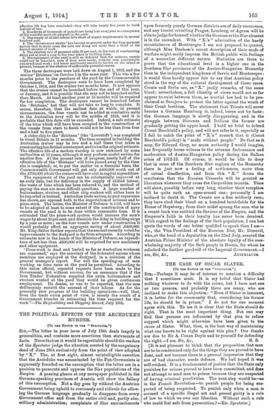THE POLITICAL EFFECTS OF THE ARCHDUKE'S MURDER.
[To THZ EDITOR OF TER " SPECTATOR.."] Sin,—The letter in your issue of July 18th deals largely in generalities, and contains more assertions than statements of facts. Nevertheless it would be regrettable should the readers of the Spectator judge the situation created by the sanguinary deed of June 28th exclusively from the point of view adopted by "X." The, at first sight, almost unintelligible assertion that the Archduke was assassinated by the Pan-Germanists is apparently founded on the assumption that the latter are in a position to persecute and oppress the Slav populations of the Empire. A passing glance at any newspaper published in the German-speaking provinces of Austria will show the fallacy of this assumption. Not a day goes by without the Austrian Government being upheld to contumely and ridicule for allow- ing the German language gradually to disappear from every Government office and from the entire civil and, partly also, military administration; complaints of Slav encroachments upon formerly purely German districts are of daily recurrence, and any tourist revisiting Prague, Lemberg, or Agram will be able to judge for himself whether the German or the Slav element is in the ascendant. With " X..'s " admiration of the hardy mountaineers of Montenegro I am not prepared to quarrel, although Miss Durham's recent description of their mode of warfare might easily impress the British public with feelings of a somewhat different nature. Statistics are there to prove that the educational level is a higher one in the Southern Slav provinces of the Austro-Hungarian Monarchy than in the independent kingdoms of Servia and Montenegro: it would thus hardly appear fair to say that Austrian policy stood in the way of the cultural development of these races. Croats and Serbs are, as "X." justly remarks, of the same blood; nevertheless, a full identity of views would not so far appear to exist between them, as martial law had to be pro- claimed at Serajevo to protect the latter against the wrath of their Croat brethren. The statement that Trieste will never become a German Hamburg is, indeed, borne out by facts : the German language is slowly disappearing, and in the struggle between Slovenes and Italians the former are gradually getting the upper hand. I hold no brief to defend Count Berchtold's policy, and will not refer to it, especially as I fail to catch the point of " X.'s " remark that it (Count Berchtold's policy) is " made without people." Be that as it may, Sir Edward Grey, no mean authority I would imagine, has frequently borne witness to the extreme forbearance and moderation of Austro-Hungarian policy during the Balkan crisis of 1912-13. Of course, it would be idle to deny that in some of the Southern Slav regions of the Monarchy there is just now a feeling of restlessness, more than of actual disaffection, and from this " X. " draws the conclusion that the Russian Cossacks will be greeted as liberators whenever they cross the Carpathian mounts. Time will show, possibly before very long, whether their reception will be quite such an open-armed one ; personally I am inclined to doubt it. The Croats are a fine soldierly race; they have shed their blood on a hundred battlefields for the House of Hapsburg ; from their midst sprang the man who in a recent book was entitled the Saviour of the Empire, and the Emperor's faith in their loyalty has never been deceived. With regard to the feelings of the Serb population, I can but quote the words of one better qualified to speak than I am— viz., the Vice-President of the Bosnian Diet, Mr. Dimovia, who, at the head of a deputation on the 22nd July, assured the Austrian Prime Minister of the absolute loyalty of the over- whelming majority of the Serb people in Bosnia, for whom he solicited the further goodwill of the Imperial Government.—I


































 Previous page
Previous page